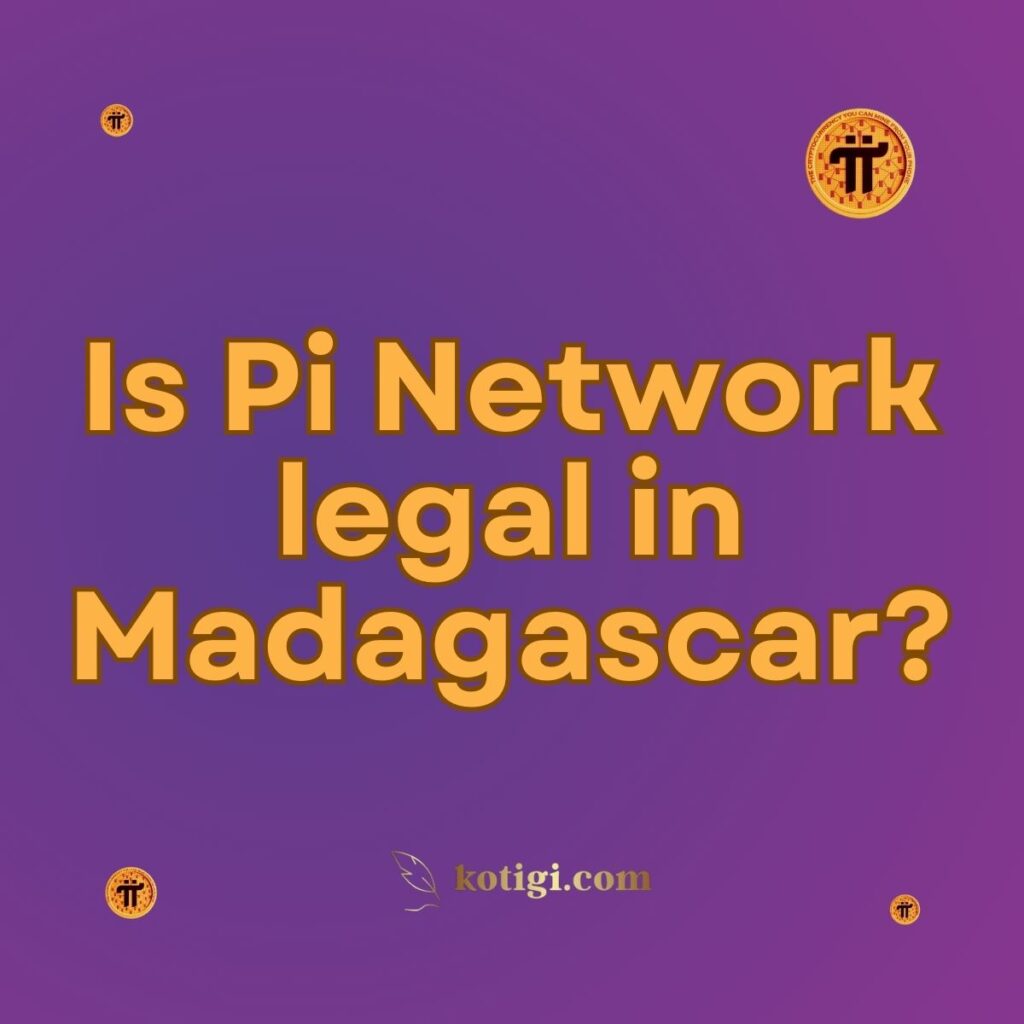
Is Pi Network legal in Madagascar?
The legality of Pi Network in Madagascar is currently uncertain. Like many countries, Madagascar has not yet established formal regulations regarding the use of cryptocurrencies, including Pi Network. While there are no explicit bans or restrictions, users should proceed cautiously and stay informed about potential future regulations that could impact their participation in the network.
Introduction
As cryptocurrencies continue to gain global traction, Madagascar is seeing a growing interest in platforms like Pi Network. However, the country’s regulatory stance on digital currencies remains unclear, leaving many potential users wondering about the legal status of Pi Network. While Madagascar has not imposed any strict cryptocurrency laws, the absence of a defined framework can create uncertainty.
In this article, we will explore the current state of cryptocurrency regulations in Madagascar, how Pi Network fits into this landscape, and what users should know to stay compliant with possible future laws.
Cryptocurrency Regulations in Madagascar
No Clear Legal Framework for Cryptocurrencies
Madagascar has not yet introduced formal laws or regulations governing the use or trading of cryptocurrencies. This creates a gray area for projects like Pi Network, as there are no specific rules that explicitly allow or prohibit their usage.
Without official regulations, the government’s stance on digital currencies remains ambiguous. This means that while users are not breaking any specific laws by participating in Pi Network, they are also not protected by any legal guidelines.
Current Financial System and Regulatory Environment
Madagascar’s financial system is still developing, and the focus of regulators has been on traditional banking and financial institutions. While there is increasing interest in digital financial services, such as mobile banking, the adoption of blockchain technology and cryptocurrencies has been slower compared to other regions.
For now, this lack of attention on cryptocurrency leaves users free to explore platforms like Pi Network without interference. However, as the global trend shifts toward greater regulatory scrutiny of digital assets, Madagascar may eventually follow suit by introducing cryptocurrency-specific regulations.
Pi Network’s Role in Madagascar’s Financial Landscape
Pi Network’s Unique Model
Pi Network offers a different approach to cryptocurrency, using a mobile mining system that doesn’t require financial investments or energy-intensive processes like traditional cryptocurrencies. This makes it potentially less likely to attract immediate regulatory attention in Madagascar.
Because Pi Network is still in its early phases, users are primarily engaging in the project by mining Pi coins through their mobile devices, without conducting any real financial transactions. This can be an advantage in regions like Madagascar, where financial regulations are still evolving and cryptocurrencies are not yet fully understood by authorities.
Future Legal Considerations
As Pi Network transitions into its open mainnet and Pi coins become tradable, the legal landscape in Madagascar could shift. If the government begins to regulate cryptocurrency exchanges or digital assets more rigorously, Pi Network users may find themselves subject to new restrictions.
For now, Pi Network remains in a neutral position within Madagascar’s regulatory framework, but users should remain vigilant as the platform matures.
Legal Risks for Pi Network Users in Madagascar
Uncertainty in Future Regulations
While Madagascar currently lacks cryptocurrency laws, this doesn’t guarantee that it will remain that way indefinitely. As blockchain technology becomes more widespread, governments around the world are taking steps to regulate digital currencies, and Madagascar may eventually introduce its own legal framework.
Users in Madagascar should be prepared for the possibility that new cryptocurrency regulations could be implemented in the future. Staying informed about potential changes in the legal environment will help users navigate any evolving risks.
Global and Regional Influences
Madagascar’s legal stance on Pi Network may be influenced by broader regional and global trends in cryptocurrency regulation. As international organizations and neighboring countries adopt more formal cryptocurrency policies, Madagascar may feel pressured to establish its own set of rules.
For instance, countries like South Africa and Nigeria have already taken steps toward regulating cryptocurrencies, and these moves could inspire similar actions in Madagascar as it continues to modernize its financial infrastructure.
International Perspectives on Cryptocurrency Regulation
South Africa’s Regulatory Approach
South Africa, as one of the more developed economies in Africa, has adopted a proactive approach to cryptocurrency regulation. The South African Reserve Bank (SARB) is working on a framework that seeks to regulate and oversee cryptocurrency activities, with the goal of mitigating risks such as fraud and money laundering.
Though not directly related to Madagascar, the policies set by South Africa could influence the region and push other countries to adopt similar regulations.
Nigeria’s Cryptocurrency Ban
In contrast, Nigeria has taken a stricter stance by banning cryptocurrency transactions in the banking sector. In early 2021, the Central Bank of Nigeria issued a directive preventing financial institutions from facilitating transactions involving cryptocurrencies. This aggressive stance demonstrates the wide range of regulatory approaches that African countries can take.
For Madagascar, this creates uncertainty, as the government could lean toward either stricter regulations like Nigeria or more flexible frameworks like South Africa.
The Future of Pi Network in Madagascar
Potential for Regulatory Development
Madagascar’s lack of current regulations does not mean the country will never regulate cryptocurrencies. As blockchain technology and cryptocurrency adoption grow globally, Madagascar could eventually see the introduction of laws governing the use and trading of digital assets.
In this context, Pi Network’s mobile mining model might offer a smoother path toward legal acceptance than more traditional cryptocurrencies, as it focuses on network participation rather than financial transactions at this stage.
Importance of Staying Informed
For Pi Network participants in Madagascar, it’s essential to remain informed about both local and international cryptocurrency developments. As Pi Network continues to grow and expand its capabilities, the legal environment surrounding digital currencies may evolve.
Users should keep a close eye on any announcements from both Madagascar’s government and international organizations to ensure they stay compliant with any emerging regulations.
Caution for Pi Network Users in Madagascar
Limited Legal Protections
Because Madagascar has not yet implemented formal cryptocurrency laws, users of platforms like Pi Network have limited legal protections. This can pose a risk if users encounter issues or if the government decides to crack down on cryptocurrency activities in the future.
For now, Pi Network users in Madagascar should engage with the platform cautiously, avoiding large-scale investments or financial activities until there is more clarity around the legal status of digital currencies in the country.
Monitoring Global Trends
It’s important for users in Madagascar to stay updated on global cryptocurrency trends and regulations. As more countries introduce formal rules and frameworks, Madagascar may eventually follow suit, and users will need to adapt to any changes that arise.
By keeping track of global developments, Pi Network participants in Madagascar can better understand what to expect and how to navigate the legal landscape.
Conclusion
The legality of Pi Network in Madagascar remains uncertain due to the absence of formal cryptocurrency regulations. While there are no explicit bans on Pi Network, the country’s lack of legal guidelines creates a gray area for users. As Pi Network grows and introduces its open mainnet, participants in Madagascar should remain cautious and informed about potential legal changes.
In the future, Madagascar may develop a clearer regulatory framework for cryptocurrencies, but for now, users must proceed with caution and stay vigilant about any updates to local laws.
Key Takeaways
- No Cryptocurrency Regulations: Madagascar has not introduced formal laws governing the use of cryptocurrencies, including Pi Network.
- Pi Network’s Mobile Mining: The platform’s mobile mining system may shield it from immediate regulatory attention, but this could change as the project develops.
- Future Legal Risks: Madagascar could introduce cryptocurrency regulations in the future, impacting how users participate in Pi Network.
- Regional Influences: Neighboring countries like South Africa and Nigeria have taken different approaches to cryptocurrency regulation, which may influence Madagascar’s legal stance.
- Stay Informed: Users in Madagascar should monitor local and global cryptocurrency developments to ensure they remain compliant with any new regulations.





